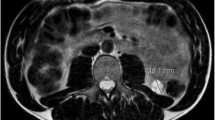Abstract
Incidental findings are inevitable as clinical research and practice transitions from a single gene approach to a genomic approach. A novel deletion of the Fumarate Hydratase (FH) gene was identified in a 22 year old male who underwent a molecular karyotype as part of an autism spectrum disorder research project. This unexpected result implies a predisposition to Hereditary Leiomyomatosis and Renal Cell Cancer (HLRCC), a rare, autosomal dominant condition and has unforeseen implications for him and his family. We review the typical features and management of HLRCC and discuss the challenges that face health professionals, as genetic testing advances and becomes more accessible.


Similar content being viewed by others
References
Law R, Dixon-Salazar T, Jerber J et al (2014) Biallelic truncating mutations in FMN2, encoding the actin-regulatory protein formin 2, cause nonsyndromic autosomal-recessive intellectual disability. Am J Hum Genet 95:721–728
Kiuru M, Launonen V (2004) Hereditary leiomyomatosis and renal cell cancer (HLRCC). Curr Mol Med 4:869–875
Isaacs JS, Yun JJ, Mole DR et al (2005) HIF overexpression correlates with biallelic loss of fumarate hydratase in renal cancer: novel role of fumarate in regulation of HIF stability. Cancer Cell 8:143–153
Mroch A, Laudenschlager M, Flanagan J (2012) Detection of a novel FH whole gene deletion in the propositus leading to subsequent prenatal diagnosis in a sibship with fumarase deficiency. Am J Med Genet 158A:155–158
Menko FH, Maher ER, Schmidt LS et al (2014) Hereditary leiomyomatosis and renal cell cancer (HLRCC): renal cancer risk, surveillance and treatment. Fam Cancer 13(4):637–644
Lehtonen HJ (2011) Hereditary leiomyomatosis and renal cell cancer: update on clinical and molecular characteristics. Fam Cancer 10:397–411
Fokkema IF, Taschner PE, Schaafsma GC, Celli J, Laros JF, den Dunnen JT (2011) LOVD v. 2.0: the next generation in gene variant databases. Hum Mutat 32(5):557–563
Alam N, Rowan A, Worth N et al (2003) Genetic and functional analyses of FH mutations in multiple cutaneous and uterine leiomyomatosis, hereditary leiomyomatosis and renal cancer, and fumarate hydratase deficiency. Hum Mol Genet 12:1241–1252
Pavlovich C, Schmidt L (2004) Searching for the hereditary causes of renal-cell carcinoma. Nat Rev Cancer 4:381–393
Toro JR, Nickerson ML, Wei MH et al (2003) Mutations in the fumarate hydratase gene cause hereditary leiomyomatosis and renal cell cancer in families in North America. Am J Hum Genet 73:95–106
Merino MJ, Torres-Cabala C, Pinto P et al (2007) The morphologic spectrum of kidney tumors in hereditary leiomyomatosis and renal cell carcinoma (HLRCC) syndrome. Am J Surg Pathol 31:1578–1585
van Spaendonck-Zwarts K, Badeloe S, Oosting S et al (2012) Hereditary leiomyomatosis and renal cell cancer presenting as metastatic kidney cancer at 18 years of age: implications for surveillance. Fam Cancer 11:123–129
Iliopoulos O, Eng C (2000) Genetic and clinical aspects of familial renal neoplasms. Semin Oncol 27:138–149
Berg JS, Khoury MJ, Evans JP (2011) Deploying whole genome sequencing in clinical practice and public health: meeting the challenge one bin at a time. Genet Med 13:499–504
Green RC, Berg JS, Grody WW et al (2013) ACMG recommendations for reporting of incidental findings in clinical exome and genome sequencing. Genet Med 15(7):565–574
Bombard Y, Robson M, Offit K (2013) Revealing the incidentaloma when targeting the tumor genome. JAMA 310(8):795–796
Burke W, Antommaria AHM, Bennett R et al (2013) Recommendations for returning genomic incidental findings? We need to talk! Genet Med 15(11):854–859
van El C, Cornel M, Borry P (2013) Whole-genome sequencing in health care. Recommendations of the European society of human genetics. Eur J Hum Genet 21:580–584
Lemke AA, Bick D, Dimmock D et al (2013) Perspective of clinical genetics professionals toward genome sequencing and incidental findings: a survey study. Clin Genet 84:230–236
Strong KA, Zusevics KL, Bick D et al (2014) Views of primary care providers regarding the return of genome sequencing incidental findings. Clin Genet 86(5):461–468
Acknowledgments
Thank you to Trent Burgess, Senior Scientist-Molecular Cytogenetics, Victorian Clinical Genetics Services (VCGS) at the Royal Children’s Hospital, Parkville, Victoria, who confirmed the deletion and provided the gene deletion graphics for this article.
Author information
Authors and Affiliations
Corresponding author
Ethics declarations
Conflict of interest
The authors declare that they have no conflict of interest.
Informed consent
Informed consent was obtained from all individual participants included in the study.
Rights and permissions
About this article
Cite this article
Duong, BT., Savarirayan, R. & Winship, I. Incidental diagnosis of HLRCC following investigation for Asperger Syndrome: actionable and actioned. Familial Cancer 15, 25–29 (2016). https://doi.org/10.1007/s10689-015-9829-5
Published:
Issue Date:
DOI: https://doi.org/10.1007/s10689-015-9829-5




